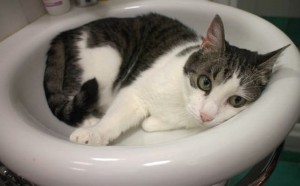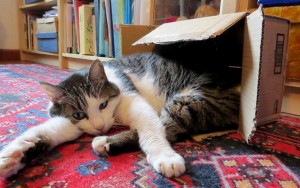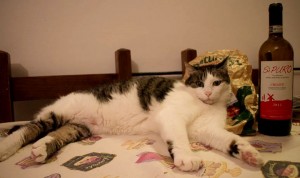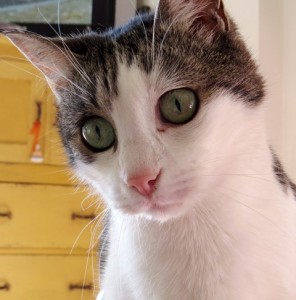 Last year Stefano and I took our eldest cat, Puzzola, to the vet because she had peed all over my bathrobe, which indicated in no uncertain terms that she had a urinary tract infection (I wrote a post about this episode in February 2013, btw). The vet confirmed the infection and immediately put her on antibiotics. Then, while checking her out, the vet found a small nodule on Puzzola’s thyroid gland. A blood test confirmed what she suspected–Puzzola had hyperthyroidism. At that time, it was a very mild case…
Last year Stefano and I took our eldest cat, Puzzola, to the vet because she had peed all over my bathrobe, which indicated in no uncertain terms that she had a urinary tract infection (I wrote a post about this episode in February 2013, btw). The vet confirmed the infection and immediately put her on antibiotics. Then, while checking her out, the vet found a small nodule on Puzzola’s thyroid gland. A blood test confirmed what she suspected–Puzzola had hyperthyroidism. At that time, it was a very mild case…
Puzzola was supposed to go back for a checkup (=blood test) after a month or thereabouts, but all this unfortunately happened while my father-in-law was very ill…and, with all that was going on, we just couldn’t deal with stressing out Puzzola, too. So I just gave her the recommended dose of Tapazole, the conventional drug prescribed for hyperthyroid humans, too. 
For a while I put her (and the other cats, too) on C3 Complex curcumin powder, which I mixed in with their canned food, but, while some (= the eldest cats) loved it, others (= the youngest) simply refused to eat it after a while…Then, when we left for the States to visit my parents last summer, I couldn’t bring myself to ask our wonderful cat/house sitter to prepare the curcumin mixture for the cats on top of everything else she was doing for us. As a result, the cats went without curcumin for months.
A few weeks ago I noticed that Puzzola was more agitated and anxious than before (and it wasn’t because she had begun drinking wine, as the photo on the right might suggest 😉 ). Her behavior was simply, well, odd. I made an appointment with the vet immediately.

Well, in a nutshell, her blood test results are simply terrible. TERRIBLE. Her liver numbers are sky high. SCARY high…
And her hyperthyroidism is now listed as “SERIOUS” (“grave” in Italian). The vet assured us, though, that Puzzola is not terminally ill. But we need to intervene. And that is what we are doing. By the way, this, I hope, will explain why I haven’t been blogging recently. All my free time is spent doing heaps of research on hyperthyroidism in cats…
I’ve looked at clinical trials, I’ve looked at natural remedies…anything and everything. I know all there is to know, practically, about feline hyperthyroidism–its causes (BPAs in cans has been linked to this condition, for example) and treatments. I’ve read heaps of forum comments, both in Italian and English, written by other humans who have hyperthyroid cats…
Anyway, the first changes we made were as follows:
- We have increased her daily dose of Tapazole. This doesn’t make me happy at all, because this drug comes with a bunch of side effects, including liver toxicity!, but for now she seems to tolerate it well, even at the higher dose.
- I am back to mixing curcumin into the cats’ canned food once a day. The eldest cats lick their plates clean and most often meow/stare at me for more…the youngest cats will gulp it down one day but turn up their noses at it the next…But the important thing is that Puzzola absolutely loves the stuff. I mix the Tapazole in with her curcumin wet food. Thus far it has worked like a charm.
 She seems to have calmed down a lot, though sometimes she still goes wacky (her metabolism is on the go-go-go all the time, poor sweetie). Just a few minutes ago, for example, she ran helter-skelter into my study and wouldn’t settle down…aaaaagh. We’re also trying to give her milk thistle for her liver (she’s so difficult, though, and so far hasn’t taken it)…
She seems to have calmed down a lot, though sometimes she still goes wacky (her metabolism is on the go-go-go all the time, poor sweetie). Just a few minutes ago, for example, she ran helter-skelter into my study and wouldn’t settle down…aaaaagh. We’re also trying to give her milk thistle for her liver (she’s so difficult, though, and so far hasn’t taken it)…
Her next set of tests have been scheduled for May.
Last week we took her to a homeopathic vet who admitted to having treated only FIVE cats with hyperthyroidism in her entire career. She hadn’t even heard of the feline hyperthyroidism-homeopathic remedy clinical trial that I asked her about. Uhm.
Furthermore, among other things, she suggested that we put Puzzola on a raw meat diet that included chicken and turkey. Yes, raw. Oh, and, worse, RAW PORK. When I brought up the issue of possible salmonella (etc.) contamination, she told us that freezing raw meat KILLS salmonella and other nasties. Well, from what I have since read online, that appears not to be the case: freezing chicken meat can slow down the growth of salmonella, but it doesn’t kill it. Well, I am hugely disappointed and doubt we’ll be going back…
I am taking the diet issue seriously, though. I want to bring down Puzzola’s numbers AND I want my cats to be on the BEST diet possible. I have eliminated anything that contains corn and wheat and by-products (oh yes, I am the crazy cat lady reading labels in pet food stores…), and the raw meat diet is also OUT–even before it began!–but we have been giving all the cats some slightly cooked meat (cooked rare), the same meat we ourselves eat…
We have always given our cats what we thought was the best cat food available (only bought at the local pet food store, no supermarket brands, no crappy cheap stuff with fillers and so on ). But now we’re not so sure it’s the very best. I’ve been looking at cat food that is grain-free and possibly also low in iodine (but not Hill’s y/d, which can also cause problems, it seems!)…
Unfortunately, there are no simple answers…and so my search goes on…
Hi Margaret, sorry to hear about your cat. I have started feeding my dog raw organic mince and chicken, I did try kangaroo meat but he did not like it. I gave it to my friend and her cat loved it. Have done research on it and it’s very good for both humans and animals, not sure if you can get it in Italy. I hope your cat responds to curcumin quickly and gets better soon. I also give my dog curcumin and have been for about three years, he is 12 and still looks like a puppy.
Hi Margaret.
I know you have mentioned before that your cats are “inside cats” , meaning they do not normally go outside. I was wondering if you are somehow supplementing them with vitamin d in order to keep them vitamin d sufficient. I’ve read before that glass, as in window glass can have uv blocking effects further making it harder for your cats to get vitamin d from sun exposure. They need vitamin d just like we do in order to help maintain good health and their bodies are setup to convert uv rays from the sun in a similar way to humans.
In humans, vitamin d deficiency health issues can show stronger symptoms as winter ends when vitamin d levels can reach their lowest levels as fat stored reserves are depleted and no new vitamin d is produced until the sun gets higher in the sky as spring advances. It is said that vitamin d is not actively produced from sun exposure until your shadow is shorter than you are tall as a general rule of thumb and that would be the earliest that meaningful production would start. How’s your shadow looking in your neck of the woods right now?
Some human studies show that vitamin d deficiency is common in people with hyperthyroidism. I imagine that your “inside cats” would normally be vitamin d deficient if you are not actively supplementing them in some way??? Even if vitamin d deficiency is not the cause of your cat’s hyperthyroidism, it might be a contributing factor and making Puzzola vitamin d sufficient may help the healing process. Vitamin d is anti-inflammatory and chronic inflammation can definitely disturb the healing process.
In any case, you can have your cat’s vitamin d level tested to rule this out as a contributing factor and to make sure it is at an optimal level to promote healing during an ongoing disease process. I have not researched it, but I suspect that vitamin d cofactors like K-2, magnesium, calcium etc. might also be helpful. I would say ask your vet, but it sounds like you might be better off asking your “next vet”!
Best of luck and health, Puzzola!
Art
Hi Margaret
My thoughts are with you and Puzzola. You left me such a nice and comforting comment when my cat Catie passed away last month. I still miss her terribly. She had hyperthyroidism as well. She was 16 years old and it was difficult to get her to take her medication no matter how I tried to disguise it. My vet had it made into a compound I rubbed in her ears. She loved her ears pet so it worked well. I am glad the Puzzola tolerates her meds well and even likes the curcumin!! She is a beautiful cat. I love the pictures you posted. I wish her wellness and healing! I know it’s so hard to have a pet with a chronic illness. She has a good mama though! It sounds like you are on top if things and love all of your cats so much. Give extra love to Puzzola and know you are in my thoughts!
Carol
I also have a hyperthyroid cat and am hoping for the best.Now using curcumin.It works best with an oil .Because Itty Bitty won’t touch the stuff I use a feeding syringe.I use 5ml coconut oil mixed with 50 grams of curcumin and just shoot it down his throat.I do that with any supplement that he won’t eat.Easy as pie this way